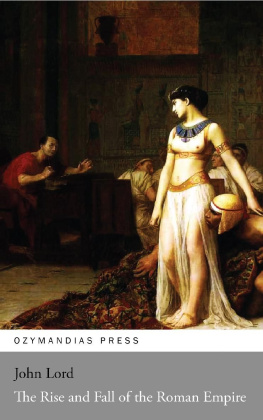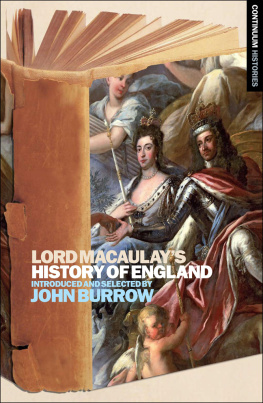John Lord - Beacon Lights of History, Volume 14
Here you can read online John Lord - Beacon Lights of History, Volume 14 full text of the book (entire story) in english for free. Download pdf and epub, get meaning, cover and reviews about this ebook. year: 2015, publisher: Scholars Choice, genre: Non-fiction. Description of the work, (preface) as well as reviews are available. Best literature library LitArk.com created for fans of good reading and offers a wide selection of genres:
Romance novel
Science fiction
Adventure
Detective
Science
History
Home and family
Prose
Art
Politics
Computer
Non-fiction
Religion
Business
Children
Humor
Choose a favorite category and find really read worthwhile books. Enjoy immersion in the world of imagination, feel the emotions of the characters or learn something new for yourself, make an fascinating discovery.

- Book:Beacon Lights of History, Volume 14
- Author:
- Publisher:Scholars Choice
- Genre:
- Year:2015
- Rating:4 / 5
- Favourites:Add to favourites
- Your mark:
- 80
- 1
- 2
- 3
- 4
- 5
Beacon Lights of History, Volume 14: summary, description and annotation
We offer to read an annotation, description, summary or preface (depends on what the author of the book "Beacon Lights of History, Volume 14" wrote himself). If you haven't found the necessary information about the book — write in the comments, we will try to find it.
Beacon Lights of History, Volume 14 — read online for free the complete book (whole text) full work
Below is the text of the book, divided by pages. System saving the place of the last page read, allows you to conveniently read the book "Beacon Lights of History, Volume 14" online for free, without having to search again every time where you left off. Put a bookmark, and you can go to the page where you finished reading at any time.
Font size:
Interval:
Bookmark:

AS SET FORTH IN THE PREFACE AND TABLE OF CONTENTS.
Weber, his fascinator and first inspirer.
"Der Freischutz" and "Euryanthe" prototypes of his operas.
Their supernatural, mythical, and romantic elements.
What he owed to his predecessors acknowledged in his essay on "The Music of the Future" (1860).
Marriage and early vicissitudes.
"Rienzi," "The Novice of Palermo," and "The Flying Dutchman".
Writes stories and essays for musical publications.
After many disappointments wins success at Dresden.
"Tannhuser" and "Lohengrin".
Compromises himself in Revolution of 1849 and has to seek safety in Switzerland.
Here he conceives and partly writes the "Nibelung Tetralogy".
Discouragements at London and at Paris.
"Siegfried" and "Tristan and Isolde".
Finds a patron in Ludwig II. of Bavaria.
Nibelung Festival at Bayreuth.
"Parsifal" appears; death of Wagner at Vienna (1882).
Beethoven, Schubert, and Chopin.
Other eminent composers and pianists.
Liszt as a contributor to current of modern music.
Berlioz, Saint-Sans, Tchaikovsky, Dvork, Strauss, and Weber.
"The Music of the Future" the music of the present.
His high if somewhat quixotic ideal of life.
Stimulating writings in ethics, education, and political economy.
Frederic Harrison on Ruskin's stirring thoughts and melodious speech.
Birth and youth-time; Collingwood's "Life" and his own "Praeterita".
Defence of Turner and what it grew into.
Architectural writings, lectures, and early publications.
Interest in Pre-Raphaelitism and its disciples.
Growing fame; with admiring friends and correspondents.
On the public platform; personal appearance of the man.
Economic and socialistic vagaries.
F. Harrison on "Ruskin as Prophet" and teacher.
Inspiring lay sermons and minor writings.
Reformer and would-be regenerator of modern society.
Attitude towards industrial problems of his time.
Founds the communal "Guild of St. George".
Philanthropies, and lecturings in "Working Men's College".
Death and epoch-making influence, in modern art.
Birth, parentage, and early career.
Scheme of his system of Synthetic Philosophy.
His "Facts and Comments;" views on party government, patriotism, and style.
His religious attitude that of an agnostic.
The doctrine of the Unknowable and the knowable.
"First Principles;" progress of evolution in life, mind, society, and morality.
The relations of matter, motion, and force.
"Principles of Biology;" the data of; the development hypothesis.
The evolutionary hypothesis versus the special creation hypothesis; arguments.
Causes and interpretation of the evolution phenomena.
Development as displayed in the structures and functions of individual organisms.
"Principles of Psychology;" the evolution of mind and analysis of mental states.
"Principles of Sociology;" the adaptation of human nature to the social state.
Evolution of governments, political and ecclesiastical; industrial organizations.
Qualifications; Nature's plan an advance, and again a retrogression.
Social evolution; equilibriums between constitution and conditions.
Font size:
Interval:
Bookmark:
Similar books «Beacon Lights of History, Volume 14»
Look at similar books to Beacon Lights of History, Volume 14. We have selected literature similar in name and meaning in the hope of providing readers with more options to find new, interesting, not yet read works.
Discussion, reviews of the book Beacon Lights of History, Volume 14 and just readers' own opinions. Leave your comments, write what you think about the work, its meaning or the main characters. Specify what exactly you liked and what you didn't like, and why you think so.


